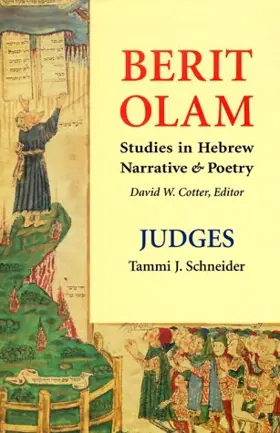

Judges
in Berit Olam: Studies in Hebrew Narrative and Poetry
Pages
317 pages
Publisher
Liturgical Press
Published
2000
ISBN-13
9780814650509
The biblical book of Judges contains culturally familiar stories such as that of Samson and Delilah and Deborah and Baraq. But despite the popularity of these stories, other important stories in Judges such as that of Achsah, the raped pilegesh, and the final civil war are virtually unknown to the average reader.
Approaching Judges as a unified literary document, Tammi Schneider shows that the unity of the narrative reveals that when the Israelites adhere to the covenant established with their deity they prosper, but when they stray from it disaster follows. This is true not only in the Deuteronomistic refrains, as is recognized by many scholars, but in the whole book, and is reflected in Israel's worsening situation throughout its narrative time.
Schneider also highlights the unifying themes in Judges. She emphasizes the role of gender, family relations, and theology expressed in the biblical narrative, and uses intertextuality to better understand the text of Judges and its context in the Deuteronomistic history and the Hebrew Bible.
Approaching Judges as a unified literary document, Tammi Schneider shows that the unity of the narrative reveals that when the Israelites adhere to the covenant established with their deity they prosper, but when they stray from it disaster follows. This is true not only in the Deuteronomistic refrains, as is recognized by many scholars, but in the whole book, and is reflected in Israel's worsening situation throughout its narrative time.
Schneider also highlights the unifying themes in Judges. She emphasizes the role of gender, family relations, and theology expressed in the biblical narrative, and uses intertextuality to better understand the text of Judges and its context in the Deuteronomistic history and the Hebrew Bible.
Collections
This book appears in the following featured collections.
- Favorite Advanced OT Commentaries by Jeremy Pierce (parableman)
- Commentaries by Female Scholars by John Dyer
- Top Old Testament Commentaries by Crux Sola (Nijay Gupta's Blog)
Reviews
Tammi Schneider’s commentary in the Berit Olam series is really excellent. It offers so much insight into the Hebrew text, but it does so in a way that is eminently approachable for anyone to read. Her observations on the narrative flow are astute. She is keenly attentive to the literary design of Judges and pushes readers to consider the rhetorical impact of the artistic choices evident in the book.
[Full Review]
Critical scholar, focusing on narrative features of the text. Generally a great source for uncovering the artistry of the narratives in Judges, but does occasionally get lost in critical analysis and misses a lot of the theological wrestling which Judges should cause. Throughout, God is often referred to simply as "the deity", which I found a bit odd, suggesting something of a lack of personal encounter between the people in the narrative or the narrator and YHWH. But overall, I do like this commentary.
Studies in Hebrew Narrative & Poetry. Michael Glazier, 2000. Important contribution providing a literary synthesis of the whole book.
[Full Review]
Cet ouvrage s’inscrit dans une série d’études sur les récits et la poésie hébraïques: BeritOlam («l’alliance éternelle») qui a pour but de mettre à disposition d’un large publicintéressé par la Bible, laïcs, étudiants, professeurs dans le domaine biblique, les derniersdéveloppements en matière d’analyse littéraire des textes bibliques.Pour l’auteur le principe d’organisation du livre est théologique et non chronologique: unmessage structure totalement le récit mettant en évidence la dégénérescence d’Israëldéclinant dans une spirale descendante jusqu’au chaos; ce message est représentatif de lathéologie deutéronomiste: les Israélites s’éloignent de plus en plus de leur Dieu; celui-cirépond en envoyant temporairement des juges mais qui dirigent le peuple de façontoujours plus désastreuse et conduisent finalement Israël à l’anarchie et à la guerre civile.De façon de plus en plus claire et massive les chefs en Israël ne suivent lescommandements de leur Dieu, n’éliminent pas les nations voisines, pratiquent lesmariages mixtes et adoptent les coutumes et les idoles étrangères. A la question de fonddu livre: «qui va diriger Israël?», la seule option reste alors la royauté, développée dansles livres suivants de Samuel et Rois.L’auteur, bien qu’enseignant l’histoire ancienne du POA et l’archéologie, adopte uneapproche holiste du texte et se centre sur l’étude du livre des Juges dans sa forme finalequ’elle considère comme un document littéraire à traiter comme un ensemble cohérent.
[Full Review]



